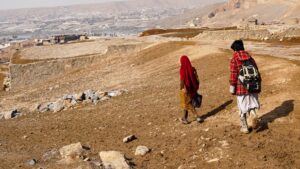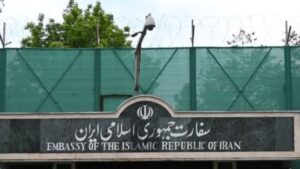KABUL (SW) – Findings by Salam Watandar indicate that during the year (solar year) 1402 (21 March 2023 to 20 March 2024) at least 17 sorts of new restrictions were imposed on women in Afghanistan on top of the 49 earlier restrictions imposed in the previous two years under the de-facto government of the Islamic Emirate.
According to this study, the sorts of restrictions imposed on women in Afghanistan reached 19 by the end of the year 1400, then to 49 by the end of the year 1401, and eventually to 66 by the end of the year 1402. However, some women are still active in the media, the Passport Department, the Police Department, and the Ministries of Education, Commerce and Industry, and Public Health, despite the limitations and challenges.
At the beginning of 1402, in 8 months with a verbal order from the Ministry for the Propagation of Virtue and the Prevention of Vice (MoPVPV) of the Islamic Emirate’s government, female nurses and doctors in Ghazni were directed that in order to continue their work, they should pay 10,000 Afghanis to get permission.
Later in In 1402, in a declaration issued by the de-facto government, Afghan women were also prohibited from working in the United Nations institutions, and in the same year, the Ministry of Public Health of the Islamic Emirate issued a declaration, prohibiting the exit examination of female physicians from universities.
The same year, in Herat, restrictions were imposed on women eating with their family members outside the house, especially in restaurants. Also, in 1402, the Islamic Emirate imposed a restriction on wedding ceremonies that women cannot change their clothes in wedding halls and they must wear hijab in wedding halls.
Following that, in 1402 in Herat, women’s hairdressing salons were told to refrain from installing security cameras and the presence of men in hairdressing salons. Later, in a statement issued by the Ministry of Promoting Virtues and Prohibiting Vice, girls were forbidden to go to private educational centers.
The same year, women were barred from working in international organizations supporting immigrants and returnees at the Spin buldak, and later, in a letter distributed by the Ministry for the Propagation of Virtue and the Prevention of Vice, women’s hair salons were given a one-month deadline to stop their work, and later all women’s hair salons were closed across the country.
Meanwhile, in Ghazni, the activities of domestic, foreign and non-governmental institutions in which women were present were stopped, and at the same time, women were also prohibited from going to mosques and prayer houses for mourning.
Also last year, according to sources and in a manner not confirmed by the government, the Ministry for the Propagation of Virtue and the Prevention of Vice issued a verbal ban in a number of provinces on girls above 10 years old and tall girls under 10 years old from going to school. Later, the Ministry of Information and Culture told Helmand Journalists’ Center to refrain from broadcasting women’s voices.
This was followed by an order issued by the Ministry for the Propagation of Virtue and the Prevention of Vice, Prohibiting women from going to “Band Amir” in Bamyan. Later, the women’s bazaar in Makrorian, area of Kabul city, was closed for women.
On the other hand, from time to time, taxi drivers did not let women in their cars without a veil, and women’s hijab was strictly checked by the officials of MoPVPV.
In continuation of these restrictions imposed on women, girls and women were arrested in a number of provinces over dress code violations, and this situation has caused girls and women to always leave their homes with fear while going out.
This was not the last of the restrictions imposed on women in Afghanistan. At the end of year 1402, the Khost security command in a letter sent to the media houses in the province, prohibited any phone calls from the girls to the media.
Restrictions imposed in 1401
Earlier, 29 restrictions were imposed on women in Afghanistan in the previous year 1401 (21 March 2022 to 20 March 2023). In the beginning of that year, women were prohibited from traveling by air without male accompanying and from going to recreational areas at the same time as men.
Later, according to an order from the Ministry of Higher Education, educational days were separated between boys and girls in universities, and all women in Afghanistan were advised to wear the Islamic hijab. Same year, via an order, female employees in visual media were told to hide their faces during the promotion of programs, and in the same month, women in Herat were also banned from driving.
According to local sources in Ghazni, later that year, female students of grades 4 to 6 were told to cover their faces while traveling and at the same time, male tailors were told to stop sewing women’s clothes.
Later, the right of women to try men was taken away. The Court of Appeal of the Islamic Emirate in Herat announced that “women do not have the right to sue their husbands in court because women’s complaints about family violence are not addressed.” Similarly, buying and selling of women’s accessories was banned in Herat and women were also banned from entering mosques.
In continuation of the imposed restrictions, the presence of women in wedding halls in Faryab was prohibited, and later, in a newsletter issued by the Department of Revenue of the Ministry of Finance, women were told that instead of them, the men of their families should work.
The same year, the spokesperson of the Islamic Emirate called the presence of women in the judicial system against Sharia laws. Later, the Ministry of Higher Education imposed a restriction on the choice of academic fields for girls followed by the role of women in television dramas prohibited through an eight-point decree by MoPVPV. Later, women’s baths, recreation centers and beauty saloons were shut.
In continuation of these restrictions, female students were banned from participating in the graduation party outside the university, and women in Ghazni were also banned from buying mobile phones connections. As per another decree by the leadership of the de-facto government, girls were prohibited from going to universities until further notice.
Earlier, the Ministry of Higher Education ordered that thesis of female students would not be accepted, and female professors, crews, and employees were also prohibited from entering universities. In continuation of that, based on the announcement of the Ministry of Economy, women were banned from working in non-governmental offices, and even religious schools/ Madrasas were closed for girls for a while.
Similarly, through an order, the cafe houses in Herat province were told to prevent women from entering, at the same year, The women’s market in Balkh was closed for some time and the women’s branches were separated from the men’s in the health centers of this province. Later, the Ministry of Higher Education issued a letter to all private universities to refrain from recruiting female students.
After collapse of the Republic
Before that, with the collapse of the Republic, the de-facto government was formed in Afghanistan, and female employees in governmental offices, female students and female workers did not go to the offices and educational centers due to their unclear fate. After the announcement of the de-facto government’s cabinet and the determination of the first steps to restrict women, female students above the sixth grade were not allowed to study.
That year , the de-facto government announced its cabinet, in which no woman was present, and the women affairs ministry was dissolved on the same day, and the Ministry for the Propagation of Virtue and the Prevention of Vice (MoPVPV) was established instead. Along with that, the activities of all institutions supporting women, including the Prosecutor’s Office for Prohibition of Violence against Women, the Independent Human Rights Commission, and later the activities of safe houses were also stopped.
On the other hand, based on the structure of the de-facto government, women do not have the right to become judges, and after the cabinet’s announcement, it became clear that women do not have the right to political, judicial and legal activities for their rights. Subsequently, all female employees in governmental offices were required to observe the “Islamic Hijab”. Restrictions were imposed on women’s civil protests, women were forbidden from going to the gymnasiums, the education of girls above the sixth grade was banned until further notice, restrictions were imposed on female employees in Kabul Municipality, and women’s work in many governmental offices was stopped.
With the cancellation of the license of safe houses, according to reports, a number of women affected by violence who were kept in safe houses were transferred to prisons for a while. Some of them joined their families and there is no news about the fate of other women.
In continuation of the imposed restrictions, in an announcement, the broadcasting of TV series in which women played a role was banned. Also, the independent association of defense lawyers was merged with the Ministry of Justice, and at the same time, the license of women’s lawyers was canceled. In a statement published by MoPVPV, broadcasting of women’s voices in Takhar, Balkh and Jowzjan provinces through audio media was also banned for some time. Also, girls were prohibited from acquiring foreign scholarships without a male accompanying them. Later, women’s travel outside the country and their internal land travel of more than 72 kilometers without a male accompanying was banned.
In the meantime, in different provinces, including Ghazni and Kandahar, the Directorates for the Propagation of Virtue and the Prevention of Vice of the provinces said verbally that female doctors and female patients without Sharia Mahram/male companion have no right to go to health centers and also in the same month, in a letter, it was said that the offices of men and women in the Ministry of Public Health should be separated.
Salam Watandar’s investigation shows that 14 cases of restrictions are based on orders, 14 cases based on announcements, 10 cases based on letters to relevant departments, 13 cases based on statements, 2 cases based on notices, 4 cases based on warnings, 2 cases unconfirmed, and 7 restrictions have been imposed on women based on the structure of the de-facto government.
Among these restrictions, 24 cases in the social and legal field, 24 cases in the work field and 18 cases in the educational fields have restricted women. Salam Watandar’s survey shows that restrictions on women are different between Kabul and provinces, and women face more restrictions in provinces. Out of all these restrictions, 24 of them have been imposed in different provinces, and 42 of them including Kabul city, have been imposed on all women across Afghanistan.
However, women’s rights activists, sociologists and psychologists consider the continuation of increasing restrictions on women as dangerous for the future of the country and ask the de-facto government to provide education and work opportunities for women.
Humaira Farhangyar, a women’s rights activist, told Salam Watandar: “Unfortunately, in the last two and a half years, women are removed from the political, social, economic and cultural arenas due to various reasons. The last facility available to women was the media to raise their voices so that their problems could be solved.”
Meanwhile, Zia Nikzad, Sociologist says about this: “The Emirate actually knows the effect of the decrees it issues on the lives of women. The view of the Emirate is Islamic-oriented and the purpose of these restrictions is to remove women from society and stay at home. The Islamic Emirate should issue decrees that are in accordance with the religion of Islam.”
Zakaria Barekzai, a psychologist, also said: “First, the schools’ gates should be opened for girls; because this can give hope to women and in the same way, the doors of universities will reopen.”
We wanted to have the opinion of the officials in the Ministry for the Propagation of Virtue and the Prevention of Vice in this regard; but in response to Salam Watandar, they said that this issue is not related to this ministry.






